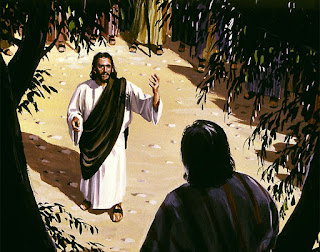A nasty man
The 24th Sunday after Pentecost
Year C
Luke 19:1-10
People who have
been bullied over the years may become bullies and abusers themselves.
The Gospel writer tells us that Zacchaeus was a “chief tax collector”.
Luke is here describing a nasty man in nasty employment. “Tax farming”
was standard practice in Jesus’ time and the job of collecting taxes was
outsourced to men who were thugs or who at least had thugs in their
retinue. Of course they added a percentage for themselves. They were
opportunists and bullies in the pay of oppressive powers (the Romans in
Judea or the Herodians in the Galilee).
It might come as no surprise then, given my opening statement, that St Luke further describes Zacchaeus as being “short in stature” - “a wee little man” as the children’s song goes. One could editorialize the whole episode and see a lifetime’s worth of payback against his own community - the slow working out of a well-developed grudge. He remains an outsider but now a powerful and dangerous outsider.
It might come as no surprise then, given my opening statement, that St Luke further describes Zacchaeus as being “short in stature” - “a wee little man” as the children’s song goes. One could editorialize the whole episode and see a lifetime’s worth of payback against his own community - the slow working out of a well-developed grudge. He remains an outsider but now a powerful and dangerous outsider.
The story hinges
around Jesus’ shouted command to Zaccheus up a Sycamore tree, where he
listens to the sermon from a safe but privileged vantage point. “Zacchaeus!”, Jesus shouts. “Come down!”.
The community’s (and perhaps the reader’s) expectation is that Jesus
will now confront and damn the unloveable traitor and exploiter of the
people. Charismatic leaders do that with bullies - they confront them.
Win or lose they will not leave them unchallenged.
Jumping to the end of the story, one finds the onlookers robbed of a bloody confrontation and a satisfying denouement.
Jesus’ words to Zacchaeus are a form of confrontation but one which
leaves the hated man unbloodied. There has been no fatal blow. The
“righteous” expectations of the community are unsatisfied.
What does it mean
to be confronted by love, convicted by kindness, bowled over by
opportunity or bashed over the head by a second chance? Any other
response on Jesus’ part would merely have confirmed Zacchaeus in his
distance from God. Jesus appears to be interested in change more than
he is in damnation. This interest in the “lot of sinners” is the tax
collector’s only hope. It is the only hope of the gathered onlookers
in this story. It is also the only hope of the contemporary readers of
my imperfect retelling of this story. Our interest in the perfect justice of God might be ideological or even theological. Our interest in his blessed mercy is intensely personal.


